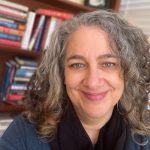Inspired by the JBC "Authors on Tour"
June 7, 2017
By Terri Brown Preuss
Sitting in the quiet car of the New York-to-Boston Acela last Friday, bumping along at 150 miles per hour, I could not believe the spark of creative energy flowing within me. As the new national director of HBI Conversations, I had just completed my first Jewish Book Council (JBC) "Authors on Tour" conference. I was moved by both the authors I heard and the conference attendees with whom I interacted, 21 of whom were HBI Conversations volunteer site coordinators. HBI Conversations is a program that brings readers and authors together for a conversation about books on Jews and gender.
This is the time each year that volunteers join together to evaluate new authors, choose authors for the coming year and mostly importantly, meet with HBI staff and each other to share best practices. The conference is dubbed a "Jewish T.E.D. talk," not for Technology, Entertainment and Design, but for Torah, Eating and Diaspora. I might substitute "Education," but it really was all this, and more.
For those of us in the Jewish literary world, the yearly JBC "Authors on Tour" conference is the the pinnacle of opportunity, providing access to the newest books with Jewish, and for HBI Conversations, gender themes. This is where our Conversations book choices are born. For three solid days, the site coordinators who organize the 12 local HBI Conversations groups, and scores of Jewish programmers like me from around the country listened to more than 200 authors. Like speed-dating, the authors have two minutes to share their work, passion and knowledge with us.
A highlight of the JBC conference, however, is the time our geographically challenged HBI Conversations community comes together as one. HBI Conversations is almost entirely volunteer-led with groups in six states and Canada. I met many of these dedicated volunteers for the first time and I found them to be discerning, interesting women who happily give their time to facilitate moving, intimate conversations about Jews and gender.
As for the conference itself, each day I learned new things about Jewish history from the Biblical Era to the Inquisition, the Shoah then and the Shoah now into the second and third generations, wars, births, deaths, love and separation, aging, depression and happiness, and food. We Jews certainly have a deep, historical and mystical connection with food. We heard from the self described "cholent writer," and the author of Matzah who likened matzah is like tofu, "a blank canvas to take any form." There were thoughtful moments when an author implored us to focus not only on tikkun olam, repairing of the world, but tikkun adam, repairing oneself through personal transformation and inner growth.
One author, in just two minutes, made us question our existence and place in the world when he noted the beautiful irony in the Talmud, Tractate Sanhedrin Mishnah, ch. 4:5, that we are each implored to say "The world was created for my sake." When the applause ended, we sat quietly and wondered how the world could be created for each us when we are billions of distinct individuals.
After the presentations, we met with the authors and others for discussion. Amidst the wine, veggie crudites, sushi and more, we spoke with the authors one-to-one. I found myself face-to-face with the writer of a new novel, a love story between a Jew and a Palestinian that received good reviews from readers. I shared my frustration with the often heard notion of "Shoah-fatigue" when it comes to Jewish books and movies. After seven years of Jewish persecution with over six million Jewish and other lives annihilated, how can we ever be done listening to these voices? The author listened and asked, "Do you ever wonder what you would have done if you could have saved someone? Would you have risked your life or your family's lives?"
I answered quickly, maybe too quickly, that yes, I would have taken that risk. Quiet at first, she then answered her own question, saying she is not sure she would have helped and that she was bothered by her answer. Her honesty and depth of thinking made me take a breath. I recalled an incident in the Target parking lot while I watched a frazzled mother hold her screaming toddler, another at her side, as she walked quickly to her car. As the mother of four children, close in age, I understood this mother's stress. However, my understanding turned to horror when I realized the mother was dragging the little bare-kneed girl on the pavement. My brain registered that this was now not okay, but instead of immediately taking action, I turned and took a moment to think. By then the girl was back in her mother’s arms, still screaming. How can I be sure how I would have reacted during the Shoah?
I turned back to the author in this kiddush-like reception in the basement of Hebrew Union College and amended my first answer, now questioning my ability to do the right thing. "It's a daily struggle to be human," I told her and meant it. A light flashed in her eyes as she looked directly into mine. She asked my name again and then we parted. Others were in line to meet her.
 Terri Brown Preuss is the national director of HBI Conversations. To learn more about HBI Conversations, contact Preuss.
Terri Brown Preuss is the national director of HBI Conversations. To learn more about HBI Conversations, contact Preuss.